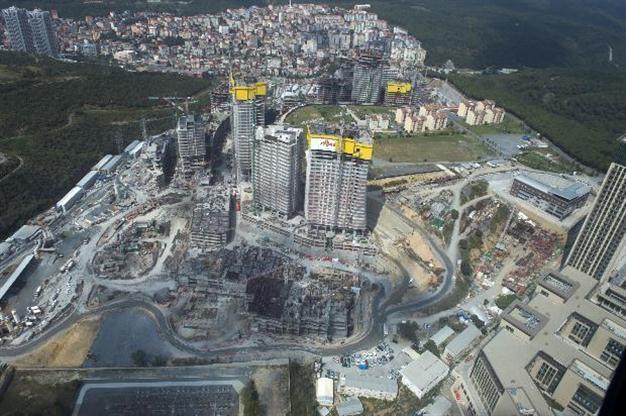Turkey gives ‘license to plunder’ for shopping malls and residential complexes
Aysel Alp ANKARA

Projects like the gargantuan 1453 Maslak residential complex built inside Istanbul's Belgrade Forest will no longer require an environmental impact report, 'thanks' to the new legislation.
Turkey’s Environment Ministry has exempted a number of construction projects – including shopping malls, residential complexes, golf courses and small sized hydro-electric plants – from the mandatory environmental impact assessment process, in blatant violation of a Constitutional Court ruling.The new legislation, which gives companies operating across many sectors a license to plunder, entered into force on Nov. 25 after being published in the Official Gazette.
“The changes are against common sense, logic or science,” the Turkish Chamber of Environmental Engineers said regarding the new legislation.
The changes are also against jurisprudence, as the Constitutional Court halted as recently as last July a previous ruling lifting the obligation to submit an impact assessment report for projects “that were included in the financial investment program prior to 1997.”
Activists had at the time stressed that bypassing environmental obligations violated several international conventions that Turkey has signed.
However, the new legislation regarding environmental assessment reports is even more daring than the previous one, lifting environmental obligations for many large projects, including:
- Shopping malls;
- Residential complexes: All projects with over 2,000 housing units are usually subject to environmental reports;
- Golf courses;
- Hospitals;
- Urban transformation zones;
- Water transmission facilities with a capacity below 100 million cubic meters (the previous threshold was only 300,000 cubic meters);
- Railroad or underground railway projects up to 100 kilometers;
- The extraction of minerals from seas, lakes and rivers.
Chamber of Environmental Engineers head Baran Bozoğlu warned that the provision regarding watercourses would indirectly clear the way for the construction of small-scale hydroelectric plants, as it allows the altering of riverbeds for construction.
Bozoğlu also argued that the provision regarding the extraction of minerals specifically targeted Central Anatolia’s Lake Tuz, where 10 new companies have received permission to produce salt despite the whole area drying up due to overexploitation.
‘Is Güllüce the construction minister?’
With the new changes, the Environment Ministry will also have the final say about all phases for many of these projects, without the intervention of courts upon lawsuits opened by citizens or groups.
“Those who will benefit from this new legislation are clearly particular companies, not the environment, nature, or the people. Is [İdris] Güllüce the environment minister or the construction minister?” Bozoğlu asked.
“A strong and autonomous Environment Ministry should be established that will act under the principle of general interest, monitoring not the rights of the investors, but those of the people and nature,” he added.
The Environment Ministry is increasingly in the spotlight for giving the green light to dozens of energy and construction projects that constitute clear threats to the environment, often after a bogus environmental assessment process.
The recent attempt to construct a coal plant on an olive plantation in the Aegean coal capital of Soma triggered nationwide outrage, while the project was eventually scrapped by the Council of State after it rejected the expropriation decision.
But the coal plant in Soma is only one example of the dozens of projects across Turkey, ranging from hydroelectric plants to mines, against which local activists are waging lengthy and difficult legal battles.
















